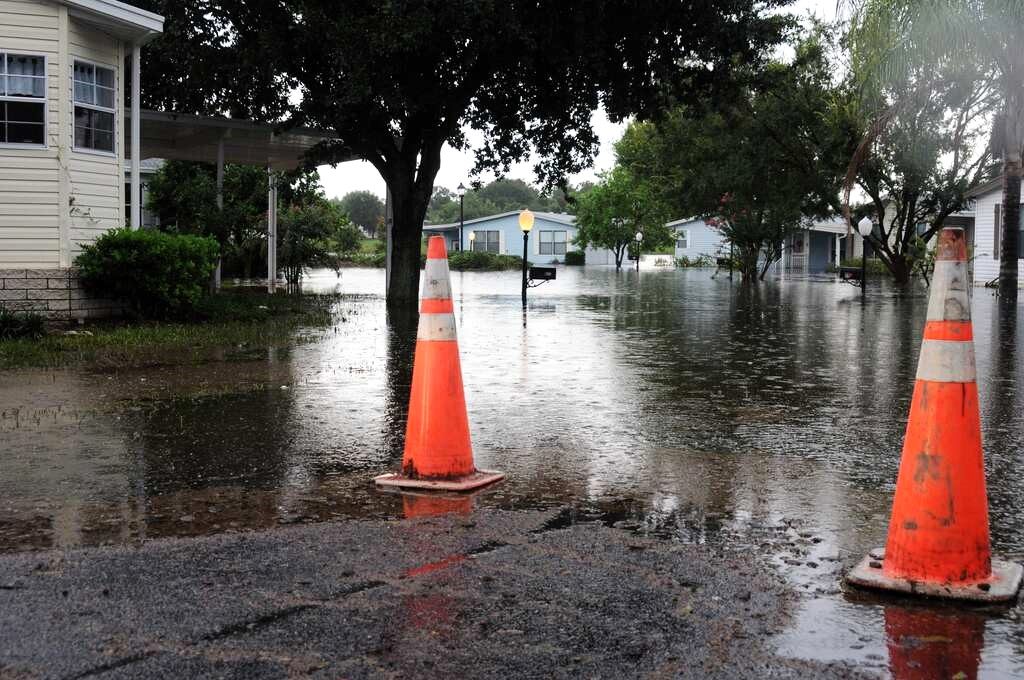
As a general rule, real estate values have risen through the decades. Today, a force is challenging that rule, and we all need to know about it before heading for the closing table. It involves the risk of weather damage and disasters.
Emergencies are affecting more real estate as the years go on. Whether a catastrophe is defined as natural, human-driven, or both — as with today’s storm surges and floods — it can lead to default on mortgages or deeds of trust. Here, we look at the risks, industry responses, and how homeowners can protect the value of their titles.
When a virus threat looms large, other risks might seem to fade. Yet more than a fourth of U.S. homes face the prospect of a one-in-a-hundred year flood. That’s far more than projected by the Federal Emergency Management Agency (FEMA), which bases its forecasts on historical occurrences. Climate is a complicating factor. One of the effects of climate disruption is sea level rise, which has already washed out billions of dollars in property value appreciation along the Gulf and Atlantic coasts. Nonprofits are warning home shoppers about the potential a decrease in home values if they buy coastal properties.
Disappearing act. What happens to the title if a rise in the water level completely takes over a property? As a matter of long-settled law, when coastlines change, the boundaries of coastal properties change with them. If the land erodes and becomes submerged, the title is extinguished.
Sometimes, “Under Water” Is All Too Real for a Mortgage Borrower.
Most weather-damaged homes can be salvaged, but for a homeowner facing a flood restoration project, monthly mortgage payments can become unbearable. Mortgage companies’ responses vary according to the nature of the emergency and how financial hardships unfold:
- If the mortgage account was in good standing until disaster struck, homeowners should call to negotiate loan modifications. If arranging a workable plan is simply not possible, the homeowner will need to understand deeds in lieu of foreclosure and other options.
- If the homeowner’s mortgage payments were in arrears for several months before a catastrophe struck, unless the parties worked out a repayment plan, foreclosure is a possibility.
- General rules can change in unusual circumstances. For example, in 2020, in response to the widespread economic impact of the coronavirus pandemic, federal forbearance allowances were made.
- A mortgage company servicing a loan backed by Freddie Mac can suspend foreclosure, on a case-by-case basis, for up to 90 days after an emergency starts.
- Companies providing Veterans Affairs (VA) mortgages must assess the damage, counsel the borrowers, and report on actions taken for property owners. The VA might expect the company to allow a 90-day payment moratorium.
Where a mortgage company has discretion, it will take into account the borrower’s loss of income and increased costs of living, including costs of finding and paying for other housing if necessary.
In the worst cases, properties cannot be saved. Research shows that some lenders, concerned about securing debt with assets that could be washed away, drop mortgages with high climate change exposure and sell them off to Freddie Mac and Fannie Mae.
It’s Storm Season. Do You Know Where Your Deed Is?

“Have you checked the title to your home?” asks Nancy Lugo of Tampa’ Florida’s Bay Area Legal Services, as quoted by the Thomson Reuters Foundation. Sometimes, people inherit houses without keeping track of the title. But clearing and safeguarding the house title is a basic need for homeowners at any time — and especially now. It’s a key criterion for disaster assistance applications.
What else can homeowners do to be sure their ownership stays clear? Some choose to pass their homes on with transfer on death deeds, where permitted by state law. Also known as a beneficiary deed, it is short, easy, and inexpensive to create and record.
Your Homeowner’s Insurance Company: Will It Be There During a Disaster?
Forbearance from an insurance company is not easily given, even in the harshest circumstances. As the Pew Trust noted:
- A minority of states directed insurance firms to hold off cancelling policies for struggling customers during the 2020 coronavirus pandemic. The cancellation suspensions were short-lived. To make matters worse, lenders sometimes foreclose on homeowners whose insurance payments lapse.
- Ninety percent of disasters involve water, but because flood insurance is so pricey, just 15% of U.S. homeowners have flood insurance.
When a house is outside of the Federal Emergency Management Agency (FEMA) flood hazard zones, mortgage applicants don’t need to buy flood insurance. But they can research flood insurance their companies might offer, and learn about the benefits of getting an elevation certificate, even where it’s not required. While typical home policies may cover sewer backups, that’s not enough for owners of inundated homes.
Following a disaster, property restoration can involve adding water-resistant elements — higher electrical outlets, pumps, protective berms. Newer homes may have higher foundations, with storm surges in mind. New materials and designs can make roofs capable of withstanding gale-force winds.
Meanwhile, what can the average homeowner do to lower risk? Insurance companies might be in the best position to advise us. Read on to find out how up-and-coming insurance companies aim to help owners keep their policies, spend less on restoration, and recover more quickly from catastrophes.
A Riskier Future Is Inevitable. Enter Disaster Preparedness Tech.
Some new companies are turning climate change data into credit risk predictions for the real estate financing sector. And in the years ahead, we’ll see the rise of disaster preparedness tech in the insurance world.
High-tech insurance (“insurtech”) startups want to disrupt traditional home insurance with their services for homeowners in disaster-prone areas. Equipped with data analytics, keen on dealing with catastrophes proactively, they are in the business of informing as well as insuring. With insurtech, companies can plan ahead in unprecedented ways:
- They can recommend steps clients can take to get lower rates, like building berms and buying storm shutters.
- They’re tapping into the emerging drone economy, with its visual intelligence analysis for disaster preparedness.
- They may employ parametric flood sensors to trigger payouts, affirmatively helping building owners to remove expensive equipment before it’s ruined, and to start restoration quickly.
Emerging technologies will also be needed to shut down fraud. Because there will always be those people who never let an emergency go to waste. The Wall Street Journal has taken note of a new breed of disaster investors. Owners of badly damaged homes, especially uninsured or underinsured homes, may see no other choice but to let their houses go to these home flippers for absurdly low prices.
Pro tip: Some states have flood disclosure laws. But be sure to undertake due diligence when studying the risks inherent in any home for sale. Florida, one of the most susceptible to rising sea levels, has traditionally lacked a disclosure mandate. This kind of risk might be beneath the radar for home shoppers, yet it matters profoundly to all of us who invest in real estate to build wealth.
We can ignore climate change and its impact on homeownership, but that’s not a resilience plan. Today, we all should make time to learn about risks and mitigation policies in any place we’d like to live.
Supporting References
Rachel Koning Beals, Banks Increasingly Unload Flooded-Out Mortgages at Taxpayer Expense, MarketWatch (November 2, 2019).
Carey L. Biron, Torch, Radio…House Deeds? U.S. Readies for Hurricane Season, Reuters (July 17, 2019).
Terry Ross, How Do Natural Disasters Affect Foreclosures? MortgageOrb.com (July 2008).
Photo credits: Tim Evans, via Unsplash; George Armstrong, via FEMA (permission: https://www.fema.gov/photo-video-audio-use-guidelines)
